| Srl | Item |
| 1 |
ID:
100322
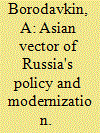

|
|
|
|
|
| Publication |
2010.
|
| Summary/Abstract |
International Affairs": We all know that the APR is developing into another power center as a hub of global economic development with a much greater impact on global politics. What are the main factors behinds its balanced development and what is Russia's role in these processes?
Aleksey Borodavkin, Deputy Foreign Minister of Russia: In recent years, the center of global economic development and political interaction has shifted to the APR where the East Asian export-oriented economies, though hit, together with the rest of the world, by adverse conjuncture, suffered much less of the global financial and economic crisis than Europe and America. The region has retained its role of a driving force of world economy; the national economies are much closer intertwined than before which adds vigor to regional economic integration and stirs up centripetal trends behind the polycentric regional order which is taking shape before our eyes.
Russia, Siberia and the Far East in the first place, should capitalize on its geographical proximity to the rapidly rising region to embrace the innovation development patterns and modernize its economy. The meeting chaired by President Medvedev which took place in Khabarovsk on 2 July 2010 arrived precisely at this conclusion.
From the 18th century onwards, Russia realized itself as a great power stretching from the Atlantic to the Pacific and a progressive civi-lizational project. Our past suggests that we should clarify the priorities to be able to join concrete political and economic projects to the advantage of our people.
|
|
|
|
|
|
|
|
|
|
|
|
|
|
|
|
| 2 |
ID:
123204


|
|
|
| 3 |
ID:
118608
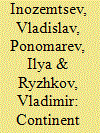

|
|
|
|
|
| Publication |
2012.
|
| Summary/Abstract |
Siberia is an immense territory that stretches for over 12.4 million square kilometers from the eastern slopes of the Urals to the Pacific Ocean. It took Russia more than four hundred years to develop this land in what proved to be the most ambitious colonization effort in history, during which one European people inhabited an area spanning from the eastern edge of Europe to the middle of North America's Pacific coast. Today Siberia's territory is large enough to easily accommodate any contemporary country. At the peak of the expansion (including Russian Alaska) this "European offshoot" (a term coined by Angus Maddison to denote territories occupied by European powers and subsequently inhabited mostly by descendants from Europe) was larger than the New World's Spanish colonies from Cape Horn to California and Texas, and could incorporate British territories in Asia three times over.
|
|
|
|
|
|
|
|
|
|
|
|
|
|
|
|
| 4 |
ID:
101058
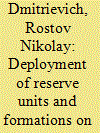

|
|
|
|
|
| Publication |
2010.
|
| Summary/Abstract |
This article surveys the subject generating military reserves for the Soviet Union's Red Army in the Siberian Military District during the first two years of the Soviet-German War (1941-45). A subsequent article will address the transfer of regular army formations and units to the Western theater of military operations during the same period of the war.
|
|
|
|
|
|
|
|
|
|
|
|
|
|
|
|
| 5 |
ID:
091043


|
|
|
|
|
| Publication |
2009.
|
| Summary/Abstract |
During the 1950s, Stalinist planners (whose modest slogan was "We order the wind when to blow, the rain when to fall!") wanted to flip the direction of several voluminous north-flowing rivers of Western Siberia (Irtysh, Ob, Yenisei) and use them to change the Soviet Central Asia into an irrigated communist paradise. Fortunately, Stalin died and Khrushchev had other problems, but before 1960, the megaproject propensities of the Soviet experts working in Mao's China left a deep imprint on China's water engineers. Soviet experts helped plan a number of audacious water projects but only one, the first dam across the Huanghe, or Yellow River, at Sanmenxia, was completed before their withdrawal. The dam turned out to be a major disaster, and the rapid silting of the reservoir was solved years later only by creating large outlets at the dam's bottom and drastically reducing its electricity-generating capacity.
|
|
|
|
|
|
|
|
|
|
|
|
|
|
|
|
| 6 |
ID:
123201
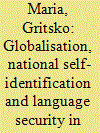

|
|
|
| 7 |
ID:
178949
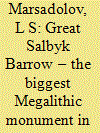

|
|
|
| 8 |
ID:
151328


|
|
|
| 9 |
ID:
128495
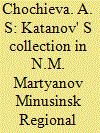

|
|
|
|
|
| Publication |
2013.
|
| Summary/Abstract |
Twelve files, which include the correspondence between N. F. Katanov and N. M. Martyanov, are kept in the archive of Minusinsk Regional museum of local lore'. They give an opportunity to evaluate the contribution of N. F. Katanov to the development of the museum and his interest in his homeland. N. F. KatanOv's letter of 24 January 1894 from Saint Petersburg concerning decoding of Orhon and Yenisei Old Turkic inscriptions is highly characteristic: "Herewith I send my book of script for the museum. Be glad and let all Siberia be glad! In December 1893 Danish researcher W. Thomson and our researcher V. V. Radloff found the most correct key for reading Runic inscriptions. Radloff grew young for 30 years. The script is original, phonetic. About six months ago, Radloff had only guessed and now at the direction of Thomson (with whom he corresponded) and underhis new considerations he learnt to read absolutely fluently. One inscription dates from 738 AD and testifies about Chinese trade with the Arabs and Siberia. . .''.Z
|
|
|
|
|
|
|
|
|
|
|
|
|
|
|
|
| 10 |
ID:
124303
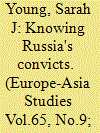

|
|
|
|
|
| Publication |
2013.
|
| Summary/Abstract |
The essay explores the significance of questions of knowledge to the depiction of prisoners in three prominent katorga narratives from the second half of the nineteenth century: Dostoevskii's Notes from the House of the Dead, Kennan's Siberia and the Exile System, and Chekhov's Sakhalin Island. Comparing the different discourses of unknowability these authors employ, it argues that the relationship of the writers or narrators to the outcast status of the convicts takes their texts beyond the immediate context, to shape views of the penal system as expressing the increasing instability of identity, social hierarchies and moral life in Russia.
|
|
|
|
|
|
|
|
|
|
|
|
|
|
|
|
| 11 |
ID:
100345
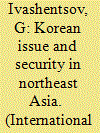

|
|
|
|
|
| Publication |
2010.
|
| Summary/Abstract |
IN NORTHEAST ASIA, Russia's domestic and external interests are interconnected like in no other region. The guarantee of Russia's future as a great power lies in the economic, technological and social development of Siberia and the Far East. In regard to this vast region, the country's leadership has now set ambitious, far reaching goals whose accomplishment is to produce great results. There is no doubt that the stable development of Siberia and the Russian Far East with their natural and other resources will be comparable in its effects to the development of the West in the United States more than 100 years ago if it does not exceed them. It will, without a doubt, make an impact on all development processes both in the Asia Pacific region and outside.
The Legacy of the Cold War
THE RESOLUTION of domestic problems requires the absence of external threats. The main source of the military threat in Northeast Asia is the 60 year military confrontation on the Korean Peninsula. The Korean War started on June 25, 1950 between two Korean camps - the North, which strove to use the Soviet model for the country's unification, and the South, which committed itself to U.S. standards. In the context of the Cold War that local armed clash developed into a large scale military conflict which had almost put the world on the brink of a nuclear war. The great powers - the United States, Britain, the USSR, and China, as well as the UN, which started working on the Korean issue in 1947 and in 1950 actually became a party to the war - were directly or indirectly involved in the Korean War.
|
|
|
|
|
|
|
|
|
|
|
|
|
|
|
|
| 12 |
ID:
143672
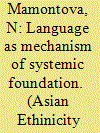

|
|
|
|
|
| Summary/Abstract |
This article explores S. M. Shirokogoroff’s critical approach to the study of language as a part of culture and a means of scientific classifications of mankind into a certain number of linguistic categories. The purpose of this article is to highlight a peculiar but rather underestimated contribution of Shirokogoroff to sociolinguistics, as his ideas were often stranded in critical relation to much that was dominant in social and linguistic thought in the first part of the twentieth century. Three dimensions of his work are mainly the focus of this article: the Ural-Altaic hypothesis, linguistic classifications, and the creation of standard languages in Soviet Russia. Finally, it discusses the applicability of Shirokogoroff’s critique to the contemporary Russian nationalities’ policy towards indigenous minorities.
|
|
|
|
|
|
|
|
|
|
|
|
|
|
|
|
| 13 |
ID:
095550


|
|
|
|
|
| Publication |
2010.
|
| Summary/Abstract |
In the 1890s the authorities in St Petersburg attributed enormous value to the introduction (nasazhdenie) of private land property in the eastern peripheral regions. It was considered an urgent task and a fundamental aspect in the overall scheme of building an empire. The article examines the preparatory materials of the 1901 law on land privatization in Siberia - in itself a failure with little practical significance - in the context of other forms of landholding and the peasant resettlement policy, within the social and spatial hierarchy of the imperial periphery. The journals of the Siberian Railroad Committee and other unpublished materials are used to highlight conceptions of individual ownership, the motivations and ideologies of the officials who endeavoured to draft the law. The debate as to who had the right to own land, and why, constantly intersected and mirrored the visions of the desired future of the eastern territories. Private property was treated as an addition to the existing social landscape and as an instrument of transformation. The search for a 'suitable' or 'enlightened' landowner represented an adaptation of the traditional social hierarchy to new conditions and new colonial duties to a large extent.
|
|
|
|
|
|
|
|
|
|
|
|
|
|
|
|
| 14 |
ID:
138506


|
|
|
| 15 |
ID:
164269


|
|
|
|
|
| Summary/Abstract |
Relying on a wide range of sources, this article examines the implementation of mobilization plans by state, military, and local authorities of Siberia during the mobilization campaigns of the summers of 1914 and 1941. It reveals the consistent pattern of difficulties encountered by Siberian military districts when attempting to fulfill mobilization plans over the periods of World Wars I and II.
|
|
|
|
|
|
|
|
|
|
|
|
|
|
|
|
| 16 |
ID:
126850
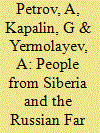

|
|
|
|
|
| Publication |
2013.
|
| Summary/Abstract |
The article describes the contribution of people from Siberia and the Russian Far East to the colonization of California, and the foundation and development of Fort Ross. It also shows the significance of the Russian Orthodox Church's activity in this area.
|
|
|
|
|
|
|
|
|
|
|
|
|
|
|
|
| 17 |
ID:
123205
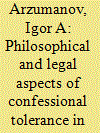

|
|
|
| 18 |
ID:
118609


|
|
|
|
|
| Publication |
2012.
|
| Summary/Abstract |
Russia has recently conducted an active policy to develop Siberia and the Russian Far East and to gain access to markets in the Asia-Pacific region. Drafting an agenda for Russia's presidency of the Asia-Pacific Economic Cooperation (APEC) in 2012 was a powerful stimulus to place an understanding of the strategic importance of this issue in the minds of the political leadership and public at large. Moscow openly proposed a thesis that it was the right moment to eliminate the imbalance between Europe and Asia in foreign-policy and in trade-and-investment cooperation priorities, as well as that a less-Eurocentric course corresponds to national interests.
|
|
|
|
|
|
|
|
|
|
|
|
|
|
|
|
| 19 |
ID:
071703


|
|
|
| 20 |
ID:
064778


|
|
|
|
|
| Publication |
Sapporo, Slavic Research Center, 2005.
|
| Description |
117p.
|
| Standard Number |
4938637340
|
|
|
|
|
|
|
|
|
|
|
|
Copies: C:1/I:0,R:0,Q:0
Circulation
| Accession# | Call# | Current Location | Status | Policy | Location |
| 049888 | 330.957085/AKI 049888 | Main | On Shelf | General | |
|
|
|
|